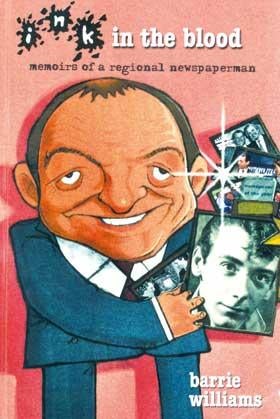
There will never be another regional press career like that of Barrie Williams. From 16-year-old trainee at the Shrewsbury Chronicle, Williams became a multi-award winning editor of the Western Morning News via stints editing the Kent Evening Post and the Nottingham Evening Post.
He was a news editor at the age of 21, when that meant coming home covered in ink, then later at the Nottingham Evening Post in 1977 he was part of the management team that brought in new technology and ‘took on the print unions long before Fleet Street”.
Now, speaking to Press Gazette from his holiday home in Portugal, Williams reflects on that career after publishing his memoirs, Ink in the Blood. The book also issues a warning to the big corporate newspaper owners about what could be lost if regional newspapers are allowed to wither in the pursuit of 30 per cent profit margins.
Shareholders
Williams’ career came to an early end just shy of his 60th birthday when Northcliffe culled many of its most experienced (and expensive) regional editors in a wave of cost-cutting.
But he is far from bitter now, he says.
‘I can’t blame the big corporate companies for their pursuit of massive profits, it’s journalistically naïve to criticise them for that. Once the bar for the big corporates had been raised to 30 per cent they all have to try and reach it.
‘If the shareholders see that Joe Bloggs is making 30 per cent profit and you’re giving him 20 per cent, he’s going to take his money there. I don’t blame them even though it was the 30 per cent profit margin that led to my premature departure from the industry.”
In his book, Williams says be believes that costs in the regional press will continue to be ‘screwed to the floor’as the big corporate owners continue their ‘management of decline”. But he does believe in the future of the regional press and says that he may have a solution.
‘Some time in the future, these big corporate companies might just be persuaded to return the regional papers back to local ownership, which is where it all started.
‘The Colonel Thomas Hardys [former Nottingham Evening Post proprietor] didn’t own these papers for profit. They wore the ownership of a newspaper like a badge of honour.
‘In every one of the local communities I worked in, there were two or three prominent local businessmen who would want to own their local daily newspaper for the same sort of Victorian reasons. They wouldn’t want 30 per cent profits – they’d just settle for a decent profit.”
Explaining why local newspapers matter, Williams says in his book: ‘If we lost our local newspapers… A very great deal of accountability to the public will be lost in all sorts of places, many local misdemeanours, crimes and corrupt practices will go unreported and consequently unexposed to the communities in which and against which they are perpetrated. The immensely powerful deterrent factor and fear of being named and shamed in the local rag will be lost and with it will go a great deal of the self-discipline which shapes decent local society.”
Pointing to the positives of the regional press, Williams says that in 30 years as an editor: ‘I never had anybody tell me how to do the job. Northcliffe is the only corporate I’ve worked for – the others were family owned. Nobody at any time in that period interfered with my rights as an editor in any way that mattered. I think that speaks volumes for the regional industry.”
Campaigning
Recalling the high points of his career, Williams says: ‘I remember most the campaigns that we actually achieved something with. You can actually change things for the better in your own community in ways that the national press can’t.”
Looking back on his time at the Kent Evening Post, he mentions a campaign on disability access called Fighting for Dignity. ‘It took Kent from being the worst county council for provision under the Disability Act to the best one in two years.’Williams is convinced that this had a knock-on effect nationwide in terms of disability access.
He also cites the Western Morning News’s Green Welly Appeal for farmers affected by foot and mouth disease, which raised £1 million – a huge amount for a local paper.
Asked whether he would opt for a career in regional newspapers if starting out today, Williams says: ‘I wouldn’t get in, I wouldn’t have the educational qualifications they want nowadays.’But when pushed, he says: ‘At no time in my life could I ever see myself doing something else, so the answer has to be yes.”
Ink in the Blood is published by Woodfield, priced £9.95
Email pged@pressgazette.co.uk to point out mistakes, provide story tips or send in a letter for publication on our "Letters Page" blog




